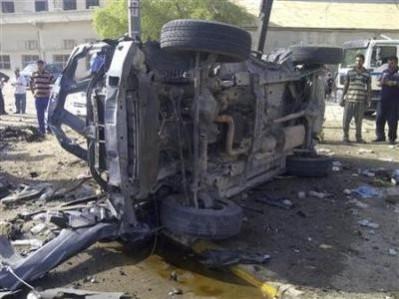Serial bomb blast rocked several cities across Iraq, killing at least 70 people and injuring over 200 on Wednesday. The attacks apparently targeting the Shi'ite pilgrims, who are celebrating a religious festival across the country, is one of the deadliest days since the United States withdrew its troops in December.

The attacks happened amid political conflict between Sunni and Shi'ite political leaders in Iraq with the opponents failing to bring down Shi'ite Prime Minister Nouri al-Maliki this month. It also coincided the death anniversary of Prophet Mohammad's great grandson Shi'ite Imam Moussa al-Kadhim, when thousands of pilgrims from across the country visit the shrine of Imam in Baghdad to mark the day.
Four blasts hit pilgrims across Baghdad, killing at least 30 people. Reuters reported that one car bomb exploded outside a Baghdad Shi'ite mosque while another blast tore into groups of pilgrims as they rested at refreshment tents along the route to a shrine in Kadhimiya district.
Bombs blasts also took place in the cities of Kirkuk, Taji, Baquba, Karbala, Mosul, Hilla, Aziziya and Balad.
"A group of pilgrims were walking and passed by a tent offering food and drinks when suddenly a car exploded near them," said Wathiq Muhana, a policeman whose patrol was stationed near the blast in central Karrada district, told Reuters.
"People were running away covered with blood and bodies were scattered on the ground," he said.
In a separate attack in the mainly Shi'ite southern city of Hilla, police said two simultaneous car bombs, including one detonated by a suicide bomber, exploded outside restaurants used by security forces, killing 22 people, reported Reuters.
"When a minibus packed with policemen stopped near the restaurants, a car exploded near the bus," said Maitham Sahib, owner of a restaurant in Hilla near the blast, told the news agency. "It's heart breaking. It is just sirens, and screams of wounded people."
The explosions that hit nine cities in the country is suspected to be the work of Sunni insurgents, as the attacks targeted the pilgrims.
A security spokesman in the capital, Colonel Dia al Wakil, said at least one of the explosions bore the hallmarks of Sunni Islamic extremists, reported Voice of America.
(With Inputs from Reuters)













!['It's not Mumbai traffic, it's air traffic': Suriya apologises to Mumbai media after paparazzi yelled At Him for making them wait for hours [Watch]](https://data1.ibtimes.co.in/en/full/806234/its-not-mumbai-traffic-its-air-traffic-suriya-apologises-mumbai-media-after-paparazzi.jpg?w=220&h=138)



